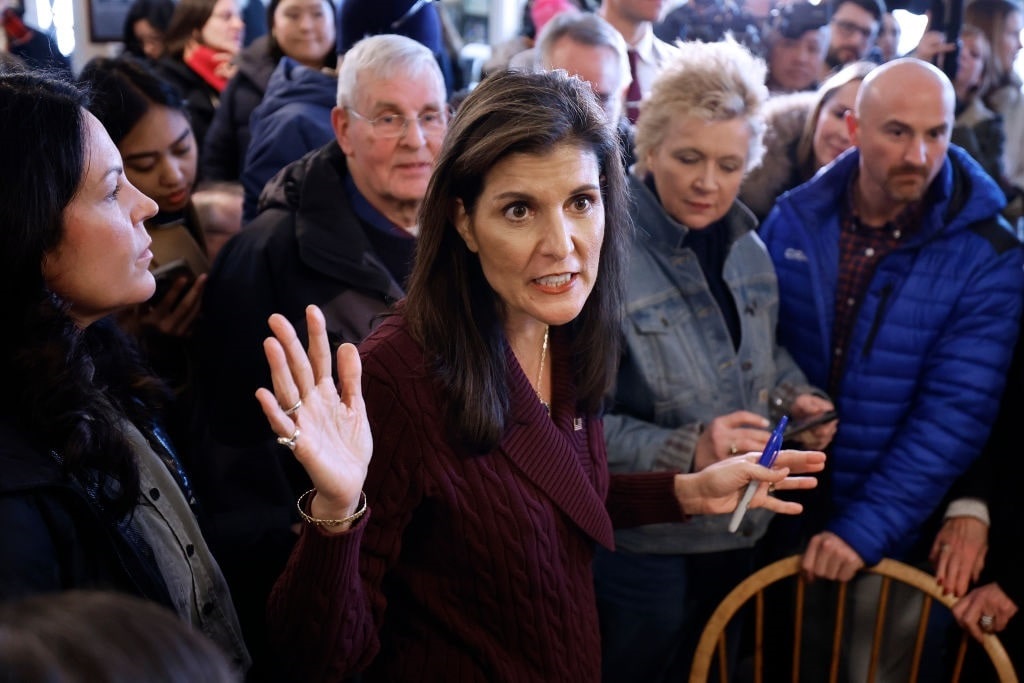And the first-in-the-nation primary is sometimes dead wrong.
Word to the wise, presidential candidate: Never underestimate the New Hampshire primary. It is oftentimes a place where campaigns go to die. The Granite State has a prickly habit of embarrassing pollsters and pundits alike in predicting winners and losers on the road to the White House. Today (Jan. 23), the GOP faithful and undecideds will cast a ballot for the remaining hopefuls. And that could throw a big monkey wrench into the momentum that former President Donald Trump mobilized in Iowa.
Former South Carolina Gov. Nikki Haley was rumored to be within single digits of Trump heading into New Hampshire. But the latest Suffolk University/NBC10 Boston/Boston Globe (what a mouthful) poll shows the opposite: Trump is gaining momentum. As the big day approaches, Number 45 is sitting strong at 55% to Haley’s 36%; Florida man Gov. Ron DeSantis was polling at 6%, which is the reason he decided to pack it in. One down in GOP ranks.
Are there rumblings about the good folks in New Hampshire dealing Trump an upset? You betcha.
Lose the Battle – Win the Rumble

Nikki Haley (Photo by Chip Somodevilla/Getty Images)
CBS News political correspondent Caitlin Huey-Burns sat down with a handful of voters in Manchester to discuss for whom they are voting and why. Two women and three men, all participating in the primary ballot cast, candidly explained themselves. Bruce McCracken was switching to Republican to vote against Trump. Another chose Haley because his primary standard was experience as a governor, and he figured DeSantis was Trump in different clothes.
The women: One still was undecided but did not like the frontrunner’s brash demeanor; Debbie Morse could not care less about the man’s manners as she wasn’t “looking for a husband or a friend,” just a president to turn this country around before it was too late.
It all blew up when one GOP panelist questioned the intelligence of Trump voters, and Morse made sure he knew she was educated and didn’t approve of labeling voters as “stupid.”
Perhaps this is the makeup of what the state has in store for Trump, as it can become a wild and woolly fracas when the undeclared voter is allowed inside the party walls. But that may also be a boon to the former president. And you can thank William Jefferson Clinton for upsetting the apple cart. From 1952 to 1988, the person elected president – Democrat or Republican – always carried the NH primary. Clinton lost New Hampshire to former Sen. Paul Tsongas (D-MA), who called himself “the economic Paul Revere.”
The trend continued: George W. Bush lost to late Sen. John McCain (R-AZ) in 2000, Barack Obama in 2008 to Hillary Clinton, and Joe Biden in 2020 to Sen. Bernie Sanders (I-VT).
Should Trump care if he loses the Granite State? He would, although it may not change the overall outcome of the GOP primary contest. New Hampshire is notorious for its version of “correcting” the results of the Iowa caucus. It’s a time-honored rivalry about which of two states has the superior contest.
New Hampshire Is Unpredictable
The Granite State began its presidential primary event in 1916 and has traditionally been the first in the United States since 1920. The GOP keeps the old-school ways – why fix it if it’s not broken? As for the Democrats, Joe Biden will not be on the ballot, having decided to head to South Carolina for the Democratic National Committee’s first-in-the-nation go-around choice.
Diehard supporters of Biden are attempting to gather momentum on a write-in campaign. It might work, but probably not. In 1968, incumbent President Lyndon Baines Johnson was also not on the ballot. And try as it might, the state party could not elevate Johnson to a majority, and his opponent, Sen. Eugene McCarthy (D-MN), was right on his heels.
For all the funk and fun of Iowa, New Hampshire is more staid and subtle. And as unpredictable as the attitude of a chestnut mare on even the best of days. Quirky, too. As the clock tolled at midnight, all six registered voters of the unincorporated community Dixville Notch became the first of the first. New Hampshire is even competitive within itself come election season.

